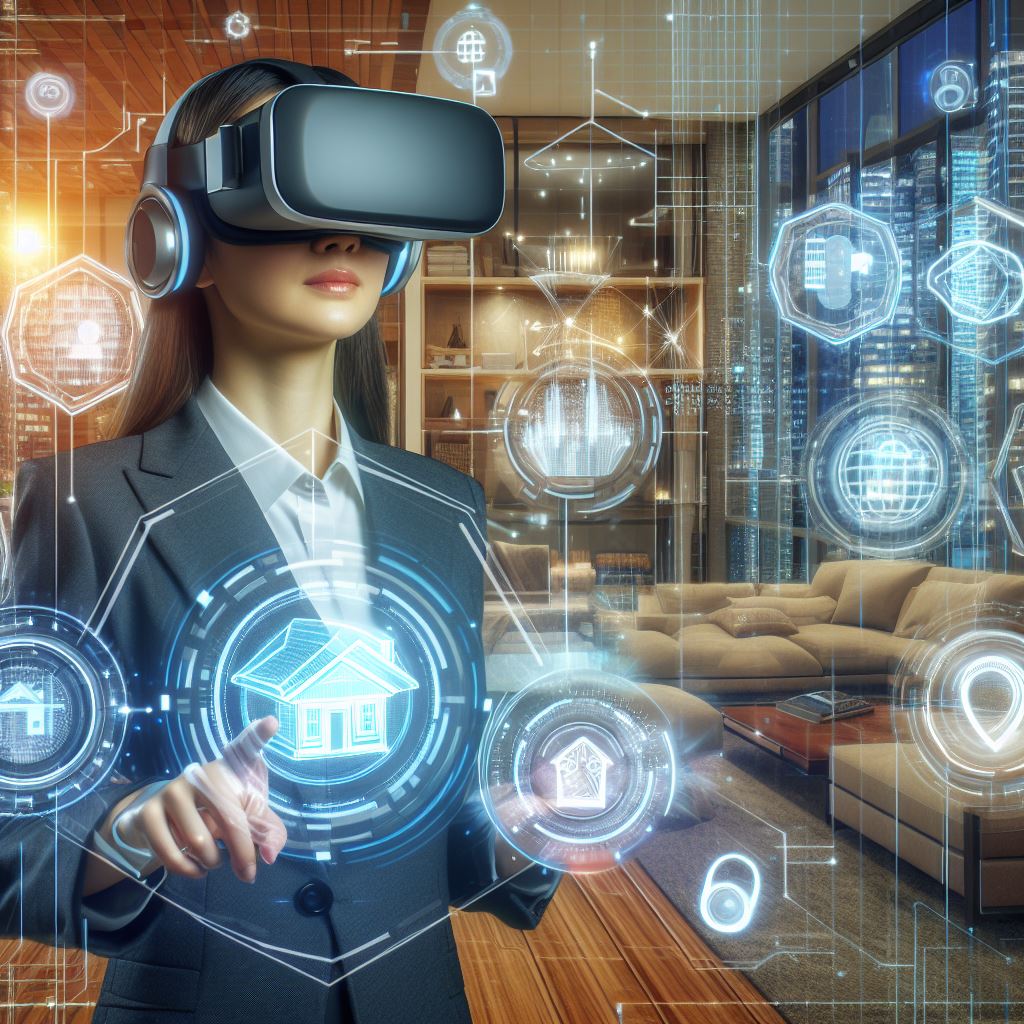Introduction
Innovative technologies are revolutionizing the real estate sector, transforming the way properties are bought, sold, marketed, and managed.
Technology has become increasingly important in the real estate industry, empowering consumers and professionals alike to make more informed decisions.
The rapid advancement of technology has led to the development of various tools and platforms that streamline and enhance the buying and selling process.
Virtual reality allows potential buyers to take immersive tours of properties without physically visiting them.
This not only saves time but also provides a more realistic and interactive experience.
Artificial intelligence and machine learning algorithms are also being integrated into the real estate industry.
These technologies analyze vast amounts of data, helping investors and agents uncover valuable insights and make data-driven decisions.
For example, AI-powered analytics can predict future property values and identify emerging trends in the market.
Furthermore, technology has transformed the way properties are marketed.
Social media platforms and online listing portals have made it easier for agents to reach a wider audience and showcase properties through visually appealing content.
Digital marketing strategies such as targeted advertisements have become commonplace, allowing agents to reach potential buyers more effectively.
In terms of property management, technology has simplified and automated numerous tasks.
Smart home devices enable remote monitoring and control of various aspects, such as temperature, security, and energy consumption.
Property management software streamlines administrative tasks, such as rent collection and maintenance requests, improving efficiency and tenant satisfaction.
In essence, innovative technologies are reshaping the real estate industry.
From virtual reality to artificial intelligence, technology is not only changing the way properties are bought and sold, but also how they are marketed and managed.
As we look towards 2024, it is clear that technology will continue to play a crucial role in transforming the real estate sector.
Artificial Intelligence (AI) in Real Estate
In today’s fast-paced technological society, it is no surprise that real estate is also embracing the power of Artificial Intelligence (AI). AI is revolutionizing various sectors and real estate is no exception.
Let’s explore some of the incredible applications of AI in the real estate industry.
AI and Its Applications in Real Estate
Artificial Intelligence refers to machines demonstrating human-like intelligence by learning from data and making informed decisions.
In real estate, AI is being used to streamline processes, enhance customer experiences, and improve accuracy.
AI-powered Chatbots for Customer Service and Property Inquiries
AI-powered chatbots are becoming popular in the real estate industry.
These chatbots provide instant assistance to customers, answering their queries promptly.
They can engage in personalized conversations, guiding potential buyers through the available properties.
Predictive Analytics and Machine Learning for Accurate Pricing Predictions
AI-powered predictive analytics and machine learning algorithms analyze vast amounts of data to provide accurate pricing predictions.
This helps real estate professionals determine the optimal price for a property based on various factors, such as location, amenities, and market trends.
Virtual Property Tours and Staging Using AI-driven 3D Modeling
AI-driven 3D modeling allows potential buyers to take virtual property tours.
This technology creates realistic and immersive experiences, enabling buyers to visualize themselves within the property.
Additionally, AI can virtually stage properties, showcasing various design options and furniture arrangements.
Increased Efficiency and Time Savings for Real Estate Professionals
AI automates various tasks, saving time and increasing efficiency for real estate professionals.
For instance, AI-powered systems can handle property valuations, transaction paperwork, and documentation processes.
This allows professionals to focus on building relationships with clients and providing personalized services.
In essence, AI is transforming the real estate industry by revolutionizing customer service, pricing predictions, virtual property tours, and enhancing efficiency.
Real estate professionals and customers alike are benefiting from the incredible power of AI.
As we look towards 2024, it is exciting to imagine how AI will continue to shape the future of real estate.
Read: Effective Communication with Challenging Clients
Internet of Things (IoT) in Real Estate
The Internet of Things (IoT) refers to the network of physical devices, vehicles, buildings, and other objects embedded with sensors, software, and connectivity that allows them to collect and exchange data.
In the real estate industry, the IoT is transforming the way properties are managed, enhancing security, energy efficiency, personalization, and decision-making.
Definition of IoT and its impact on the industry
The IoT has revolutionized the real estate sector by providing unprecedented connectivity and automation.
It enables devices and systems to communicate and collaborate, leading to enhanced efficiency, cost savings, and improved user experiences.
The impact of IoT on real estate can be seen in various aspects of the industry.
Smart home devices for increased security and energy efficiency
One of the significant applications of IoT in real estate is the integration of smart home devices.
These devices include smart locks, security cameras, thermostats, and lighting systems that can be controlled remotely.
They enhance security by providing real-time monitoring and alerts, while also optimizing energy consumption by automatically adjusting settings based on occupants’ preferences and presence.
IoT-powered asset and facility management systems for property maintenance
IoT enables the implementation of asset and facility management systems that automate maintenance processes and improve operational efficiency.
Sensors can monitor equipment performance, detect faults, and provide predictive maintenance, ensuring timely repairs and reducing downtime.
This proactive approach increases the lifespan of assets and reduces maintenance costs for real estate owners.
Data-driven insights for personalized experiences and improved decision-making
The IoT generates vast amounts of data from various devices and systems, offering valuable insights that can be leveraged for personalized experiences and informed decision-making.
By analyzing occupant behavior and preferences, real estate professionals can customize services and amenities to meet individual needs.
Moreover, data-driven analytics enable better forecasting, risk assessment, and investment strategies.
Integration of IoT data into real estate platforms and applications
To fully harness the potential of IoT in real estate, it is crucial to integrate IoT data into existing platforms and applications.
By combining data from different sources, such as sensors, devices, and social media, real estate platforms can provide comprehensive and real-time information to property owners, tenants, and other stakeholders.
This integration enhances transparency, accessibility, and user engagement.
In fact, the Internet of Things (IoT) is revolutionizing the real estate industry by introducing innovative technologies and transforming the way properties are managed.
By leveraging IoT solutions, real estate professionals can enhance security, energy efficiency, maintenance processes, personalized experiences, and decision-making.
Integrating IoT data into existing platforms further amplifies the benefits, making real estate more connected, efficient, and user-centric.
Read: Transform Difficult Real Estate Clients

Blockchain Technology in Real Estate
Blockchain Technology is revolutionizing the real estate industry by introducing transparency, security, and efficiency in property transactions.
Introduction to blockchain and its benefits
Blockchain is a decentralized digital ledger that records transactions across multiple computers.
One of its key benefits is its transparency, as all transactions are visible and verifiable by network participants.
Furthermore, blockchain eliminates the need for third-party intermediaries, allowing for faster and more cost-effective transactions.
Enhanced transparency, security, and traceability in property transactions
With blockchain, property transactions become more transparent and secure.
Every transaction is recorded on the blockchain, making it immutable and tamper-proof.
This feature ensures that property records cannot be manipulated or altered without the consensus of all network participants, providing a higher level of trust and eliminating fraud possibilities.
Additionally, blockchain allows for the traceability of property ownership history, making it easier to track past transactions and verify the authenticity of property titles.
Streamlined property records and title transfers using smart contracts
Smart contracts, self-executing contracts with predefined rules, are a key application of blockchain technology in real estate.
By using smart contracts, property records and title transfers can be streamlined, eliminating the need for manual paperwork and reducing human errors.
Once the predetermined conditions are met, such as payment completion or inspection approval, the smart contract automatically executes the transfer of property ownership.
Tokenization of real estate assets for fractional ownership and liquidity
Blockchain enables the tokenization of real estate assets, representing ownership shares as digital tokens on the blockchain.
This allows for fractional ownership, where multiple investors can own a fraction of a property, increasing accessibility and affordability.
Furthermore, tokenization provides liquidity to traditionally illiquid assets like real estate, allowing owners to sell their tokens easily and quickly.
Reduction of intermediaries and associated costs in the buying/selling process
Blockchain technology reduces the need for intermediaries, such as real estate agents, brokers, or lawyers, in property transactions.
By directly connecting buyers and sellers, blockchain streamlines the buying/selling process, reducing associated costs and delays.
This direct peer-to-peer interaction also increases trust between parties as transactions are conducted securely on the blockchain.
In short, blockchain technology offers numerous benefits to the real estate industry.
It enhances transparency, security, and traceability in property transactions, streamlines property records and title transfers, enables tokenization for fractional ownership and liquidity, and reduces the need for intermediaries and associated costs.
As the technology continues to evolve, it is expected that blockchain will transform the real estate industry even further, leading to a more efficient and accessible market for buyers and sellers alike.
Read: The Art of Keeping Clients Engaged
Augmented Reality (AR) and Virtual Reality (VR) in Real Estate
Augmented Reality (AR) and Virtual Reality (VR) are transformative technologies that have been making waves in various industries, and the real estate industry is no exception.
These cutting-edge technologies are revolutionizing the way people buy, sell, and visualize properties in 2024.
Explanation of AR and VR and their role in the industry
AR is the technology that overlays digital information onto the real world, enhancing the user experience.
VR, on the other hand, immerses users in a digitally created environment, simulating a real or imagined world.
Both AR and VR have immense potential in the real estate industry.
Virtual property tours and immersive experiences for remote buyers
Gone are the days when prospective buyers had to physically visit multiple properties to make a decision.
With AR and VR, buyers can now explore properties virtually through immersive virtual tours.
Remote buyers can get a realistic sense of the property without leaving their homes, saving time and money.
Visualizing property renovations and customizations with AR applications
AR applications allow potential buyers to envision property renovations and customizations before making any changes.
By overlaying digital renderings onto the existing property, buyers can see how their desired renovations will look, giving them confidence in their decision-making process.
Designing and staging properties using VR tools for faster sales
VR tools enable real estate agents and developers to design and stage properties virtually.
This means that potential buyers can see fully furnished and decorated spaces without physically visiting them.
VR staging accelerates the sales process by showcasing the property’s potential, attracting more interested buyers.
Integration of AR/VR technology with real estate websites and apps
Real estate websites and smartphone apps are increasingly incorporating AR/VR technology to enhance the user experience.
These platforms offer interactive 3D models, augmented property listings, and virtual walkthroughs.
This integration allows potential buyers to explore properties in a more engaging and immersive way, generating higher interest and leads.
The future of real estate looks remarkably different with the integration of AR and VR technologies.
Buyers can explore properties remotely and experience them as if they were physically present.
With AR applications, they can visualize renovations and customizations, making informed decisions.
VR tools aid in faster sales by creating visually stunning and fully staged virtual properties.
Moreover, the integration of AR and VR with real estate websites and apps opens up new marketing opportunities.
Interactive 3D models and virtual property tours provide a captivating online experience, attracting more potential buyers and increasing the chances of a successful sale.
As technology continues to evolve, so too will its impact on the real estate industry.
AR and VR are just the beginning, and we can expect even more innovative technologies to transform the way we buy and sell properties in the near future.
Read: Building Enduring Relationships with Clients
Conclusion
Innovative technologies have had a transformative impact on the real estate industry.
From artificial intelligence to virtual reality, these advancements have revolutionized how we buy, sell, and interact with properties.
Looking ahead to 2024, we can anticipate even more groundbreaking developments that will further reshape the industry.
Therefore, it is vital for professionals in real estate to adapt and embrace these technological changes to stay ahead and succeed in the field.
Failure to do so may result in falling behind competitors and missing out on valuable opportunities.
The future of real estate lies in the hands of those who can effectively navigate the merging of technology and the industry.




